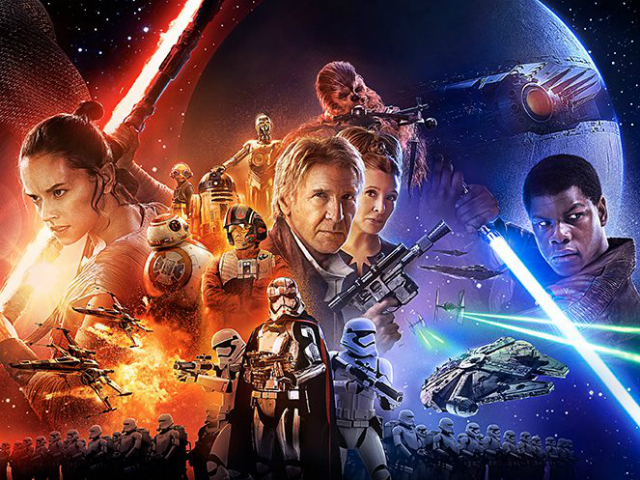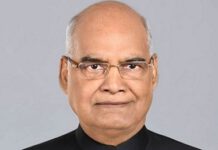-
Genre:Sci-fi, Adventure
-
Cast:Daisy Ridley, John Boyega, Harrison Ford
-
Director:J J Abrams
The big news about Star Wars: The Force Awakens is – spoiler alert – that it’s good! Despite the prerelease hype, it won’t save the world, not even Hollywood, but it seamlessly balances cozy favorites – Harrison Ford, ladies and gentlemen – and new kinetic wows along with some of the niceties that went missing as the series grew into a phenomenon, most crucially a scale and a sensibility that is rooted in the human. It has the usual toy-store-ready gizmos and critters, but it also has appealingly imperfect men and women whose blunders and victories, decency and goofiness remind you that a pop mythology like Star Wars needs more than old gods to sustain it.
J J Abrams, the director of The Force Awakens, may not have the makings of a god or an empire builder like George Lucas, but he turns out to be what this stagnant franchise needs: a Star Wars superfan and pop culture savant. Given that the fans have been doing much of the heavy lifting for a while, holding up the franchise even as the filmmakers let them down with some titanic clunkers (Attack of the Clones – why, George, why?), it seems fitting that the new film was directed by one of their own. Abrams was 11 when he saw the original Star Wars back in 1977; by the time he was a teenager, he had a gig cleaning Steven Spielberg’s old student movies.
You could call Abrams a love child of Lucas and Spielberg, born to the blockbuster world they helped make. At its best, that world taps into the wonder that can come with new visions and realms, sending you into raptures with earthly delights or those in galaxies far away. Too often, though, this world gives privilege to special effects and anonymity over story, character, directorial vision or just a little creative intelligence. Instead, moviemakers bludgeon viewers, numbing them into quiescence with pictorial monotony punctuated by apocalyptic clamor, with the same repetitive story beats, explosions, close shaves and grindingly unsurprising saves. In these pictures, good invariably triumphs over every evil except moviemaking formula.
Abrams became a small-screen name with television shows like Alias before making a discouraging transition to film directing with the third, prophetically titled Mission: Impossible. He scaled down nicely for “Super 8,” getting his Spielberg on with a story about some kids who help an alien return home. Even better was his Star Trek, an enjoyable big-screen gloss on the 1960s series that he followed with a disappointing sequel, taking two steps back. Abrams is still trying to transcend the worst of the blockbuster imperative, but with “The Force Awakens,” he shows that he hasn’t stopped learning and that the lessons have begun to pay off. (He’s backed by some of his regular crewmates, notably the cinematographer Dan Mindel and the editors Maryann Brandon and Mary Jo Markey.)
Abrams’ smart idea – an overarching ethos, really – in The Force Awakens is to have returned to basics, largely by dispensing with a lot of clutter. This is no small thing in a complicated movie universe in which the series sequence doesn’t even align with the release dates: the original 1977 film, for instance, is the fourth in the series and now known as Star Wars Episode IV: A New Hope. The Force Awakens is the seventh chapter but also the first film in what’s being called the “sequel trilogy.” This sounds headache-inducing, but it just means that Force picks up years after Return of the Jedi (1983), the third release, left off, after Luke Skywalker (Mark Hamill) prevailed over villainy with his sister, Princess Leia (Carrie Fisher), and their pal Han Solo (Ford).
Much as in the real world, though, the war has dragged on, and now Luke, Leia and Han have been succeeded by a charismatic, talented trio – played by Oscar Isaac, John Boyega and Daisy Ridley – who look more like the multitudes humankind contains, a genuine diversity too infrequently represented in our movies. Yet while these three are variations on the original holy trinity, part of what makes them contemporary isn’t just their skin colors but also the slippery playfulness of their roles. Isaac, as a resistance pilot, Poe Dameron, suggests a next-generation Han, but so does Boyega as Finn, stormtrooper turned refusenik. The one seemingly unambiguous note is that the new-school Luke Skywalker is a young woman, a desert scavenger named Rey (Ridley), who shares Luke’s skill set and love of natural fabrics.
That Finn saves Rey and she saves him in turn isn’t a new dynamic; Princess Leia, created in the wake of second-wave feminism, was always a thoroughly liberated woman, whether shooting a laser gun or working a metal bikini. Leia is now a resistance general and played with a muted twinkle and tasteful up-do by Fisher. Like Ford, she has become more of a supporting player in a crowded room that also includes Adam Driver, who brings intensity and flowing physical grace to Kylo Ren. Among the strongest creations of Team Abrams, Kylo Ren is a kind of baby Darth Vader who throws tantrums in inky-black robes while wearing a leather-and-metal-head appliance that looks like a domination mask by way of the grille of a 1952 Chevy.
Written by Abrams, with Michael Arndt and the “Star Wars” veteran Lawrence Kasdan, The Force Awakens takes off with a battle and closes on a meaningful moment of quiet. Abrams doesn’t pile on the mayhem, and, for the most part, the pace remains fast without being overly frantic. In the inaugural skirmish, you can follow Poe Dameron as he darts across the screen; he doesn’t get lost among the shadows and editing, a clarity that remains fairly consistent. As for the story, well, it’s as simple as ever, with the usual complications and a bestiary of cute, cuddly and loathsome creatures (humanoid and not) with odd names and habits that keep this circus jumping. It’s the old war of all against all, with fur and feathers, snouts and slapstick, and a guest appearance by Oedipus.
It’s no surprise that paternal problems have made a comeback in The Force Awakens, which folds in a father-and son-schism that evokes the one between Luke and Darth Vader. Even so, the more interesting Oedipal struggle may turn out to be between Lucas and his cinematic sons, starting with Abrams. Abrams has delivered a more seamlessly diverting movie than Lucas has in years, but his most far-reaching accomplishment here is casting Isaac, Boyega and Ridley – a Latino, a black man and a white woman – in this juggernaut series. It’s too early to know how this will play out as the whole thing evolves, but the images of Boyega and Ridley each holding a light saber are among the most utopian moments in a Hollywood movie this year.
Over the decades, as Star Wars grew into an entertainment machine, it took on the aspect of a cult. That at any rate is how it could feel to those of us looking at it from the outside in, especially as one mediocre movie after another with noxious creations like Jar Jar Binks crushed the box office. Abrams may be as worshipful as any Star Wars obsessive, but in The Force Awakens he’s made a movie that goes for old-fashioned escapism even as it presents a futuristic vision of a pluralistic world that his audience already lives in. He hasn’t made a film only for true believers; he has made a film for everyone (well, almost). So, will Rey, Finn and Poe save the day? Will they battle Kylo Ren and Oedipus too? Stay tuned for the next potentially thrilling or at least pretty good adventure.






























